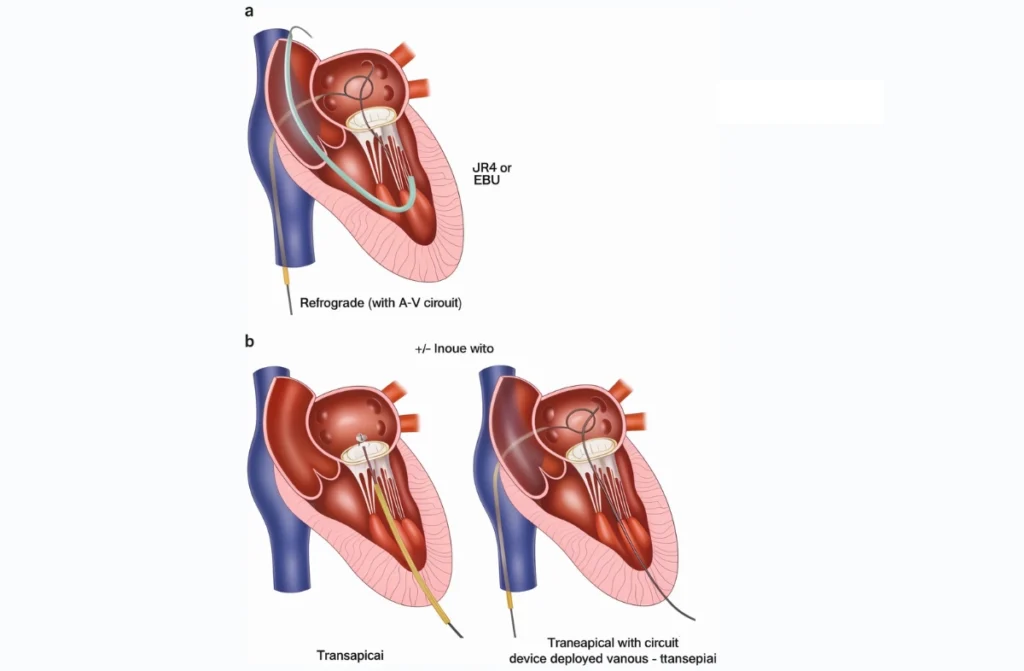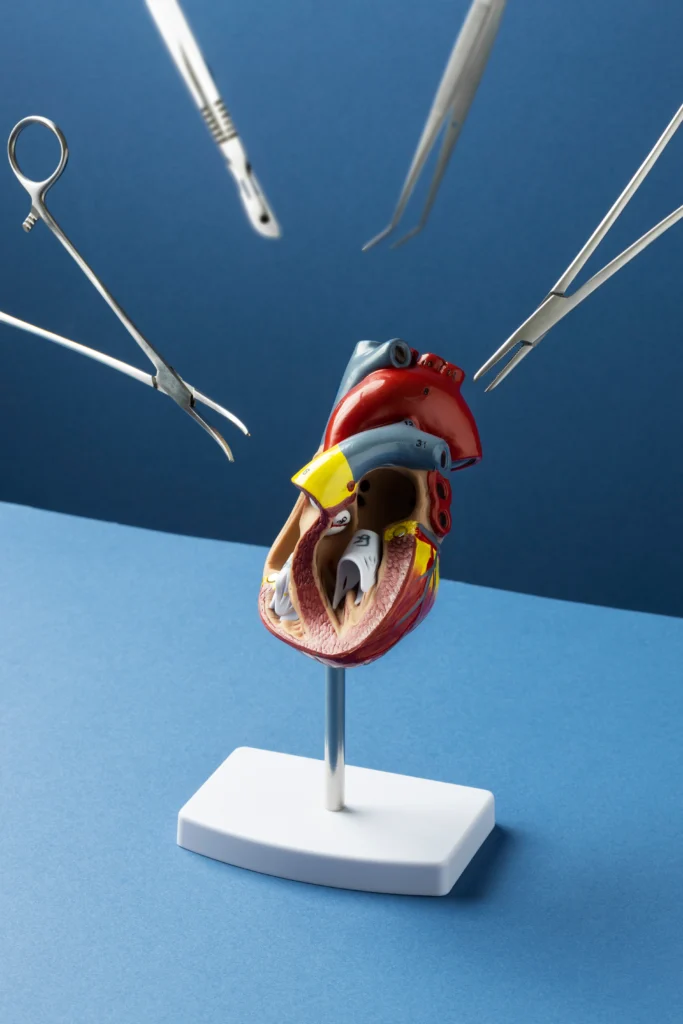Paravalvular regurgitation closure in Chennai is a minimally invasive procedure performed to repair leaks around artificial heart valves. Experienced cardiac specialists in Chennai use catheters and imaging techniques to guide the placement of closure devices, reducing regurgitation and improving heart function. This procedure offers a less invasive alternative to open-heart surgery, promoting quicker recovery and improved patient outcomes.
what is Paravalvar Leak Closure?
paravalvular regurgitation closure in Chennai, also known as paravalvular leak closure, is a medical procedure performed to address a condition called paravalvular regurgitation, commonly referred to as a paravalvular leak. This condition occurs in patients who have previously undergone heart valve replacement surgery, wherein an artificial valve is implanted to replace a damaged or diseased native heart valve.
Paravalvular regurgitation is characterized by a leakage of blood around the prosthetic valve. This leakage typically happens due to an imperfect seal between the artificial valve and the surrounding native heart tissue. As a result, blood can flow backward into the heart, causing a range of symptoms and potential complications. These symptoms may include shortness of breath, fatigue, palpitations, and, in severe cases, heart failure.

Cause of Paravalvular Regurgitation Closure in Chennai
Paravalvular regurgitation closure in Chennai is a specialized procedure aimed at treating paravalvular regurgitation, a condition characterized by leakage around an artificial heart valve. Various factors and medical conditions can contribute to the formation of paravalvular leaks. If you’re seeking expert care for paravalvular regurgitation in Chennai, consult with experienced cardiac specialists and consider the advanced treatment options available in the region to address this condition effectively., including:
- Surgical Technique: One of the primary causes of paravalvular leaks is related to the surgical procedure itself. If the heart valve replacement surgery is not performed with utmost precision, there may be an imperfect seal between the prosthetic valve and the surrounding native heart tissue. This can result in small gaps or defects that allow blood to leak around the valve.
- Prosthesis Size and Fit: The selection of the prosthetic valve size and type is critical in preventing paravalvular leaks. An improperly sized or misfit prosthetic valve can lead to gaps or mismatched areas between the artificial valve and the native tissue, promoting leakage.
- Infective Endocarditis: Infective endocarditis is a bacterial infection of the heart’s inner lining and valves. It can damage the native heart tissue and prosthetic valves, leading to the formation of defects and gaps that result in paravalvular leaks.
Who is the Right Doctor for Paravalvar leak closure?
Dr. M. Kathiresan is a well-known paravalvular regurgitation closure in Chennai, India. He is associated with the Fortis Malar Hospital in Chennai and has expertise in cardiac surgery, including procedures like paravalvar leak closure. Dr. M. Kathiresan’s qualifications, experience, and reputation make him a suitable choice for individuals seeking treatment for paravalvar leaks in the Chennai region.
Diagnosis of Paravalvular Regurgitation Closure
Paravalvular regurgitation is a condition where blood leaks around a heart valve after valve replacement surgery. The diagnosis of Paravalvular Regurgitation Closure in Chennai involves a detailed evaluation by a cardiologist. Early detection is crucial for effective treatment, as untreated cases may lead to heart failure or other complications.
Common diagnostic methods include:
- Echocardiography: The primary tool for identifying the regurgitation, assessing the extent, and visualizing the valve function.
- Transesophageal Echocardiogram (TEE): Provides a more detailed view, especially for detecting small leaks around the valve.
- Cardiac MRI: Used when echocardiographic images are inconclusive, it offers a comprehensive view of heart structure and function.
- Catheterization: In some cases, a heart catheterization may be done to assess the severity of the regurgitation.
For patients considering treatment, seeking specialized care for Paravalvular Regurgitation Closure in Chennai ensures accurate diagnosis and appropriate management.
Treatment for Paravalvular Leak Closure
The treatment for paravalvular regurgitation closure in Chennai, also known as paravalvar leak closure, aims to address the leakage of blood around a prosthetic (artificial) heart valve and prevent associated complications. The choice of treatment depends on the severity of the leak, the patient’s overall health, and the specific circumstances of their condition. Several approaches to paravalvular leak closure include:
- Percutaneous Closure:
- Description: In this minimally invasive procedure, a catheter is inserted through a blood vessel and guided to the site of the paravalvular leak.
- Procedure: A closure device, such as a plug or an umbrella-like device, is deployed through the catheter to seal the leak.
- Advantages: Percutaneous closure typically results in shorter recovery times, reduced pain, and lower risk compared to open-heart surgery.
- Surgical Closure:
- Description: The surgical paravalvular leak closure procedure involves traditional open-heart surgery.
- Procedure: Surgeons access the heart through an incision, locate the site of the leak, and repair it using sutures or patches.
- Advantages: Surgical closure is suitable for complex or hard-to-reach leaks. It allows for precise, direct access to the affected area.
- Transcatheter Closure:
- Description: Transcatheter closure combines aspects of both percutaneous and surgical methods.
- Procedure: It allows for precise control over the placement of closure devices via a catheter without requiring full open-heart surgery.
- Advantages: Transcatheter closure is beneficial for patients who are not suitable candidates for traditional surgery due to various factors, such as advanced age or multiple comorbidities.
Benefits of Paravalvular Leak Closure
Paravalvular regurgitation closure in Chennai presents a multitude of advantages to patients undergoing this procedure. Its primary objective is to enhance the patient’s overall quality of life by effectively addressing the complications associated with paravalvular regurgitation. Sealing or repairing the leakage around the prosthetic heart valve, can:
- Relieve Symptoms: Paravalvar leak closure helps alleviate symptoms like shortness of breath, fatigue, and palpitations, enabling patients to regain their energy and enjoy a better quality of life.
- Prevent Complications: By reducing or eliminating regurgitation, the procedure helps prevent potential complications such as heart failure and further damage to the heart.
- Minimize Hospitalization: Many paravalvar leak closure procedures are minimally invasive, which means shorter hospital stays and quicker recovery times compared to more invasive surgeries.
Risks of Paravalvular leak closure:
Paravalvular regurgitation closure in Chennai is generally considered safe and effective in addressing the condition of paravalvular regurgitation, but like any medical intervention, they do carry some inherent risks and potential complications. It’s important for patients and their healthcare providers to weigh the benefits against the risks when considering this procedure.
- Infection: As with any invasive procedure, there is a risk of infection at the site of catheter insertion or surgical incision. Steps are taken to minimize this risk, but it remains a potential concern.
- Bleeding: Patients may experience bleeding at the catheter insertion site, which could require further intervention, such as blood transfusion or surgical repair.
- Allergic Reactions: Some individuals may have allergic reactions to medications or materials used during the procedure, such as contrast dye or anesthesia.
Conclusion
Paravalvar leak closure, a vital medical procedure, is specifically designed to treat paravalvular regurgitation closure in Chennai, often known as a paravalvar leak. This condition can arise due to various factors, such as surgical methods, prosthesis size and fit, infections, tissue degeneration, and more. Paravalvular leaks can have a substantial impact on the patient’s well-being and can potentially result in severe complications, including heart failure.
Also, Read Rotational Atherectomy Treatment in Chennai.


